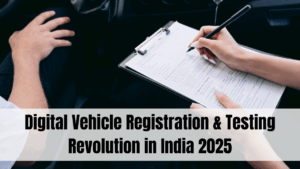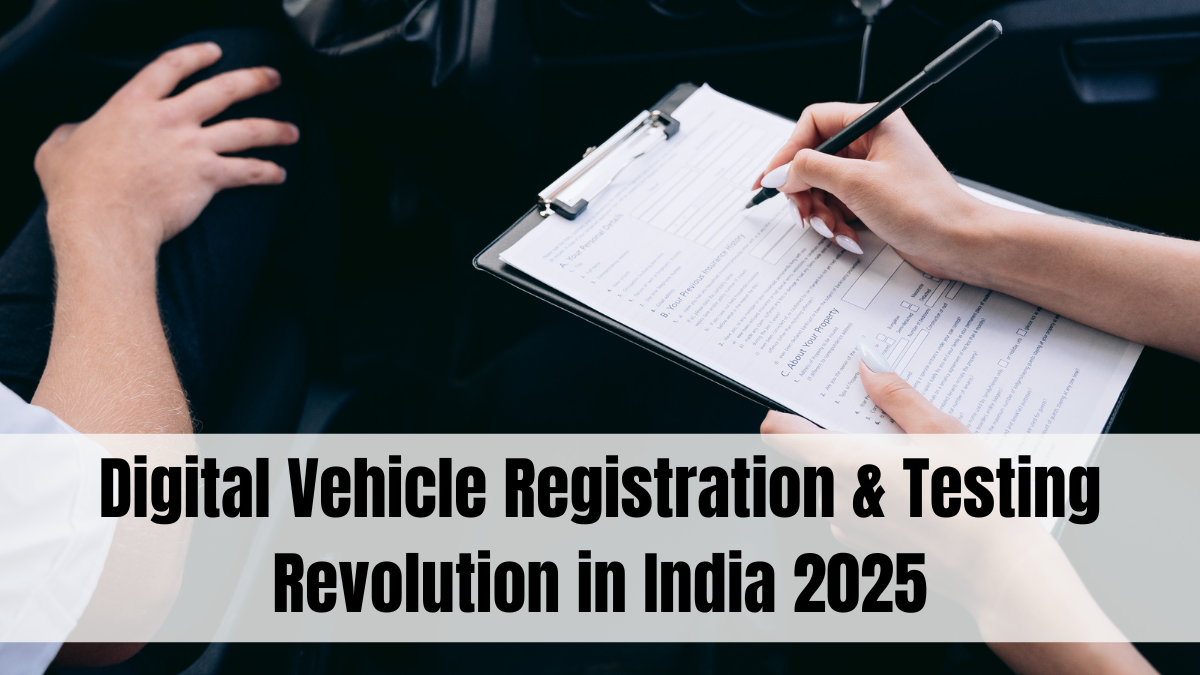The year 2025 marks a significant milestone in India’s transport sector as the government accelerates the shift towards digital vehicle registration India 2025 and online vehicle testing systems. This digital transformation promises faster, more transparent, and user-friendly services, reducing bureaucratic hurdles and improving road safety.
This article explores the key aspects of India’s digital vehicle registration and testing initiatives, benefits to vehicle owners, the technologies involved, and how this shift is changing the landscape of vehicle management.

The Need for Digital Transformation in Vehicle Registration and Testing
Traditional vehicle registration and testing processes in India often involve long queues, paperwork, and multiple visits to Regional Transport Offices (RTOs), causing inconvenience and delays. Challenges include:
-
Complex documentation procedures.
-
Lack of transparency and tracking.
-
Manual errors and delays.
-
Difficulty accessing remote or rural RTO services.
-
Inefficient vehicle fitness and emission testing processes.
Digitization aims to address these issues by leveraging technology to provide end-to-end digital services.
Key Features of Digital Vehicle Registration and Testing Systems
-
Online Application and Document Submission: Vehicle owners can apply for registration, transfer, or renewal online, uploading necessary documents digitally.
-
Automated Data Verification: Integration with Aadhaar, insurance, and pollution control boards ensures quick and accurate validation.
-
Digital Payment Gateways: Online fee payment reduces cash handling and streamlines transactions.
-
Online Slot Booking for Vehicle Testing: Owners can book time slots for emission and fitness tests to avoid waiting.
-
Vehicle Fitness and Emission Testing Digitization: Use of automated testing equipment and digital records ensures transparency.
-
Real-Time Status Updates: SMS and email notifications keep applicants informed at every stage.
-
E-Registration Certificates and Smart Cards: Digital documents reduce forgery and enhance portability.
-
Mobile Apps and Portals: User-friendly interfaces enable easy access and management of vehicle details.
These features collectively improve the efficiency and user experience.
Government Initiatives Driving Digital Vehicle Management
-
The Ministry of Road Transport and Highways (MoRTH) launched the Parivahan Sewa portal consolidating multiple RTO services online.
-
States are upgrading RTO infrastructure with digital kiosks and automated testing centers.
-
The government promotes the use of FASTag and other digital payment systems for tolls and services.
-
Collaboration with private tech firms facilitates development of AI and IoT-based testing equipment.
-
Awareness campaigns encourage citizens to transition to digital platforms for compliance.
These steps accelerate adoption nationwide.
Benefits for Vehicle Owners and the Transport Ecosystem
-
Convenience: Complete many RTO-related tasks from home or mobile devices without multiple office visits.
-
Transparency: Track application status and test results online, reducing corruption opportunities.
-
Time Savings: Online slot booking and digital document verification minimize delays.
-
Improved Compliance: Automated emission and fitness tests help reduce pollution and unsafe vehicles on roads.
-
Data Analytics: Authorities gain better insights to improve traffic planning and enforcement.
Enhanced services increase public trust and compliance.
Challenges in Implementing Digital Vehicle Registration and Testing
-
Digital Divide: Limited internet access in rural areas slows adoption.
-
Technical Glitches: System downtimes or software bugs can frustrate users.
-
Resistance to Change: Some users and officials prefer traditional processes.
-
Data Security: Safeguarding sensitive personal and vehicle information is critical.
-
Infrastructure Costs: Upgrading testing centers and RTOs requires investment.
Ongoing efforts are addressing these through training, infrastructure expansion, and security measures.
The Road Ahead for Digital Vehicle Management in India
-
Expansion of mobile-based services and regional language support to widen accessibility.
-
Integration of AI for fraud detection, predictive maintenance alerts, and personalized services.
-
Use of blockchain for immutable records enhancing trust and reducing disputes.
-
Deployment of remote vehicle inspection and telematics for real-time compliance monitoring.
-
Increasing automation in testing equipment for higher accuracy and efficiency.
These innovations will shape India’s transport ecosystem into a modern, sustainable model.
FAQs
Can vehicle registration be done entirely online in India now?
Yes, many services including new registration, renewal, and transfer are available through Parivahan Sewa.
How do I book a slot for vehicle emission testing online?
ou can use the state RTO portal or Parivahan app to select a convenient date and time.
Are digital registration certificates legally valid?
Yes, e-registration certificates issued online have the same legal validity as physical ones.
What happens if my vehicle fails the digital fitness test?
You’ll receive a report specifying issues; the vehicle must be repaired and retested to pass.
Is the digital system accessible in rural areas?
Efforts are underway to improve internet access and provide assistance centers in rural regions.
Click here to know more.
